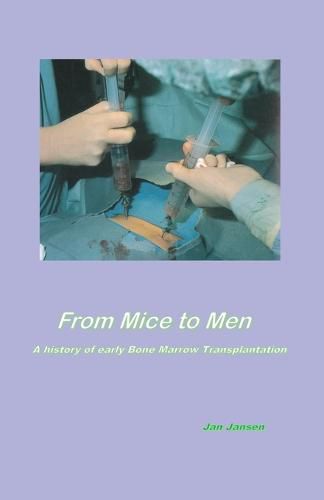Readings Newsletter
Become a Readings Member to make your shopping experience even easier.
Sign in or sign up for free!
You’re not far away from qualifying for FREE standard shipping within Australia
You’ve qualified for FREE standard shipping within Australia
The cart is loading…






This title is printed to order. This book may have been self-published. If so, we cannot guarantee the quality of the content. In the main most books will have gone through the editing process however some may not. We therefore suggest that you be aware of this before ordering this book. If in doubt check either the author or publisher’s details as we are unable to accept any returns unless they are faulty. Please contact us if you have any questions.
Bone-marrow transplantation started as a medical response to the potential damage of radiation on the production of blood cells. In the first 40 years of its existence (about 1950-1990), bone-marrow transplantation has had virtually no role in that specific arena, in spite of extensive publicity about its role in a few nuclear accidents (e.g., Chernobyl). On the other hand, this therapy has become increasingly important for the treatment of leukemia and other blood disorders. Even for some solid tumors, this treatment had a transient (breast cancer) or a continuing role.
This historical study documents how bone-marrow transplantation developed from animal studies in mice, through studies in other animals such as dogs, and primates, to the first attempts to treat patients in the late 1950’s to 1960’s. The use of identical-twin donors showed the. potential of the therapy, but when use of other related or unrelated donors became possible through the developments in tissue (HLA) typing, the field really took off. Most of the techniques still used today, had already been developed by 1990. The career and work of 8 physician-scientists who had a major impact on the development of the field, are highlighted.
$9.00 standard shipping within Australia
FREE standard shipping within Australia for orders over $100.00
Express & International shipping calculated at checkout
This title is printed to order. This book may have been self-published. If so, we cannot guarantee the quality of the content. In the main most books will have gone through the editing process however some may not. We therefore suggest that you be aware of this before ordering this book. If in doubt check either the author or publisher’s details as we are unable to accept any returns unless they are faulty. Please contact us if you have any questions.
Bone-marrow transplantation started as a medical response to the potential damage of radiation on the production of blood cells. In the first 40 years of its existence (about 1950-1990), bone-marrow transplantation has had virtually no role in that specific arena, in spite of extensive publicity about its role in a few nuclear accidents (e.g., Chernobyl). On the other hand, this therapy has become increasingly important for the treatment of leukemia and other blood disorders. Even for some solid tumors, this treatment had a transient (breast cancer) or a continuing role.
This historical study documents how bone-marrow transplantation developed from animal studies in mice, through studies in other animals such as dogs, and primates, to the first attempts to treat patients in the late 1950’s to 1960’s. The use of identical-twin donors showed the. potential of the therapy, but when use of other related or unrelated donors became possible through the developments in tissue (HLA) typing, the field really took off. Most of the techniques still used today, had already been developed by 1990. The career and work of 8 physician-scientists who had a major impact on the development of the field, are highlighted.